Excerpts of Ethics Notes - Mridul Sir's Ethics Batch
(Ethics Booklet to be Provided at the Time of Enrollment)
Ethics and Human Interface
Ethics is about quality of human character and conduct with an aim to achieve Summum Bonum by applying reasoning and rational thinking in day to day behavior.
Essence of Ethics
- Finding solution to a problem
- Establishing standards
With the evolution of society to understand right and wrong we need set of principles such as

Established standards in ethics have evolved in ancient time with quest for improving quality for character and conduct
- Determining human behavior and right and wrong
- Understanding situation based on rational thinking
- Ensuring freedom for art of questioning
Ethics deals with multiple assets of human character and conduct, that’s why it also called moral philosophy.
Descriptive ethics
It can broadly be thought of as the study of morality and moral issues from a scientific point of view. This area or branch of ethics might also be referred to as behavioral ethics.
Descriptive or behavioral ethics, then, describes and explains moral behavior and phenomena from a social science perspective or framework.
Normative ethics

Teleology has sub fields
- Utilitarianism by Bentham and Mill
- Contractrians by Thomas Hobbes, Locke and Rousseau
- Contemporary contractrians by Jhon Rawls Theory Of Justice
- Contemporary Feminist ethics or ethics of care
1. Agent theory:
- Agent theory is about emphasized on human character. Aristotle believes that if we are able to build good character, it is in turn guarantee for good action.
- Aristotle developed a theory of human action, where we can find a place for ‘agency’. His views on habits are linked to his theory of virtue and art (skill).
- Concerning institutions, Aristotle provides a sound social and political philosophy that encompasses the nature and role of institutions.
Human as five senses and human have critical thinking and reasoning. They have ability to grow 6th sense called wisdom. It is highest level of intellectual development in human.
Aristotle considers human nature as positive or being good and human is social, political and ethical animal.
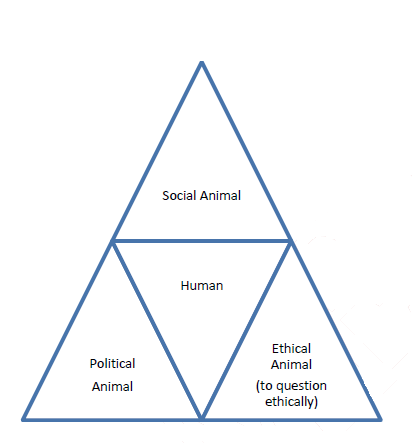
Aristotle wrote two ethical treatises:
- Nicomachean Ethics discusses the close relationship between ethical inquiry and politics
- Eudemian Ethics says human behavior is purposive and main purpose is Happiness. Achieving wisdom is highest level of happiness I.e. happiness in terms of rational thinking rather than thinking in physical leve.
To achieve this happiness human should need four qualities which gave rise to virtue of ethics
- Courage
- Temperance i.e. Emotional Intelligence : Anybody can become angry-that is easy; but to be angry with the right person, and to the right degree, and at the right time, and for the right purpose, and in the right way is right anger
- Justice i.e. governance
- Wisdom: application of rational thinking

Aristotle doctrine of mean:
He also gave doctrine of mean or golden mean to judge any human action or quality of agent.
- Foolhardiness is extreme
- Courage is golden mean
- Cowardice is deficit
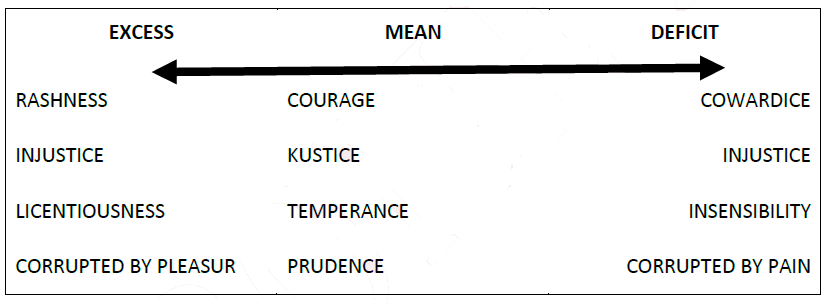
Application of Aristotle philosophy
- Individual Level
1. Scientific temperance
2. Innovation and intellectual development
3. To be good global citizen
- Society Level
1. Rational society
2. Inclusive
3. Social capital and harmony
Prejudice and discriminatory attitude in the society need Aristotle philosophy
- Governance level
1. Upholding public interest
2. Speak against corruption I.e. whistle blowing
3. Character development in public servant : PM Modi says character is important virtue of civil servants
4. Wisdom to take right decision: HC Gupta case (lack of wisdom)
1. The action should end itself. The action should not work as an means to justify some ends. ( based on rational thinking)
Example: you worship for sake of worship and not for good results
In Mahabharata Yudhistir lies to Guru Dhronacharya about Ashwadhama death to weaken his guru. (Kant means cannot justify the actions of Yudhistir)
According to Kant some moral duties for human are
- Being truthful
- Being harmless
- Being fare or just
- Respecting dignities
- Performing some duties of human
He talks about absolute duty based philosophy
Charity should not be done with an aim of god will reward with good things or deeds.
2. Human should act in such a fashion that the actions become universal. Ethics base on universal standards
People try to achieve goal through malpractices will not be universal for example cheating in exam or bribing officials to get license for factory
People will achieve goal through hard work or proper path is universal action
Applications of Kant philosophy:

Thomas Hobbes:
- Analyzed human nature and become basis for his moral philosophy
- There are three commonly held interpretations of Thomas Hobbes:
1. that he held a desire (or preference) satisfaction theory of the good;
2. that he held a purely instrumental view of rationality;
3. that he was committed to psychological egoism
Psychological egoism is a view that claims that all human actions are motivated, at bottom, exclusively by one’s self-interest;
it claims that everybody, in the end, is an egoists. This is a very strong claim. It does not merely claim that only some or the majority of human actions are generated from considerations of self-interest; but rather that all human actions
- Considers human nature as short, brutish and selfish.
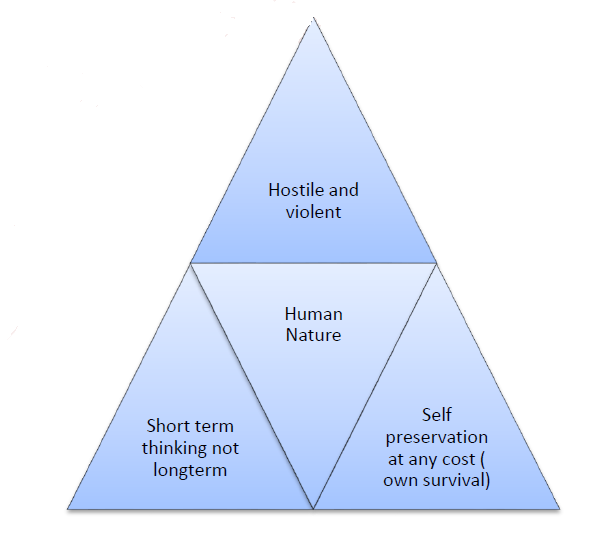
- Therefore due to that nature there will be always conflict and disharmony in the society. i.e. humans cannot govern themselves
- Human cannot govern themselves so they need state to bring peace and stability in the society. State should get power from citizens on the basis of social contract theory.
- This is the moral basis of foundation of state would enjoy absolute power, known as leviathan state but citizen would energy limited powers.
- In democratic government social contract theory leviathan strong, absolute i.e. citizen don’t have rights for maintaining peace state can take rights of citizens.
Conclusion
- Hobbes’s importance lies not only in his political philosophy but also in his contribution to the development of an anti-Aristotelian and thoroughly materialist conception of natural science.
- His political philosophy influenced not only successors who adopted the social-contract framework—John Locke, Jean-Jacques Rousseau, and Immanuel Kant, but also less directly those theorists who connected moral and political decision making in rational human beings to considerations of self-interest broadly understood.
- The materialist bent of Hobbes’s metaphysics is also much in keeping with contemporary Anglo-American, or analytic, metaphysics, which tends to recognize as real
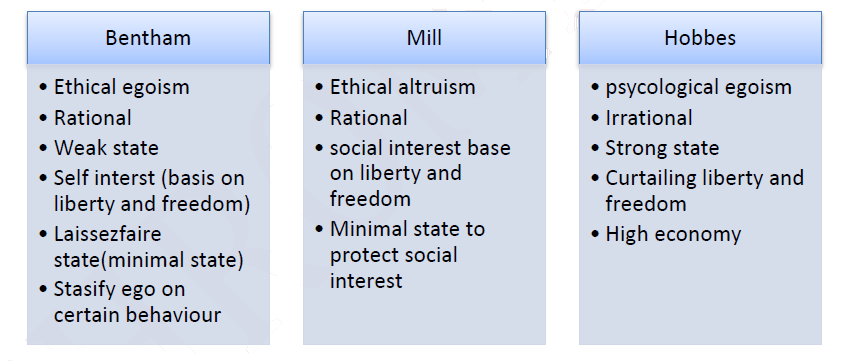
Contemporary contractrians: John Rawls
- John Rawl’s concept of social justice gives emphasis to fairness, it must be fair to all, to the most talented as well as the most disadvantage section.
- He advocates ethics based on agreement on the philosophy of veil of ignorance and reflective equilibrium
- He has given two ethical principles
1. Equality Principle
2. Differential principle
Justice:
- Justice can be fairness or reflective equilibrium or consensus achieved by people on any subject, matter, issues or problems
Veil of ignorance
Veil of ignorance
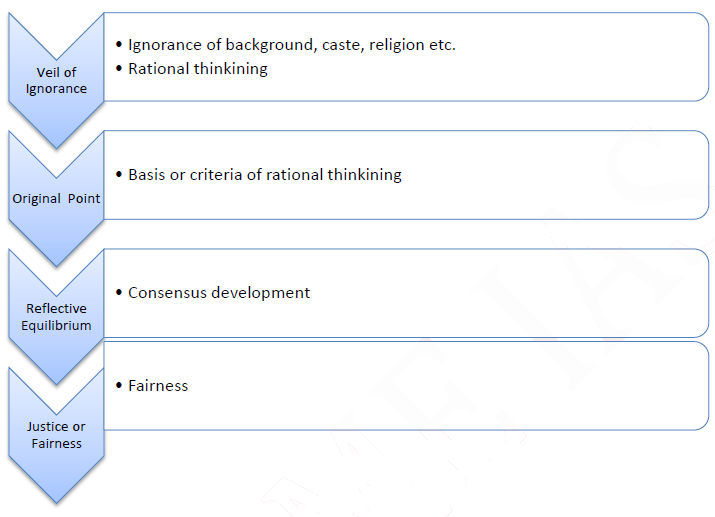
John Rawls explains human nature especially sense of justice through the process of veil of ignorance, original position and reflective equilibrium
Veil of Ignorance:
- People should not bring their background especially caste, religion, reason in their decision making
- They should not biased towards themselves rather they should play their neutral role
- For example jury committee short listing, for Bharat Ratna hey should behave without discrimination.
Original position:
- The members of committee should have meeting of mind at certain point.
- For example
Whether past sports person should also be taken into consideration or only present to taken.
Whether person those who are alive should be short listed or those who are not as well
In case of noble price, only alive persons are taken into consideration for award It is there original position
Basis of determining what is ethical or what is not ethical?
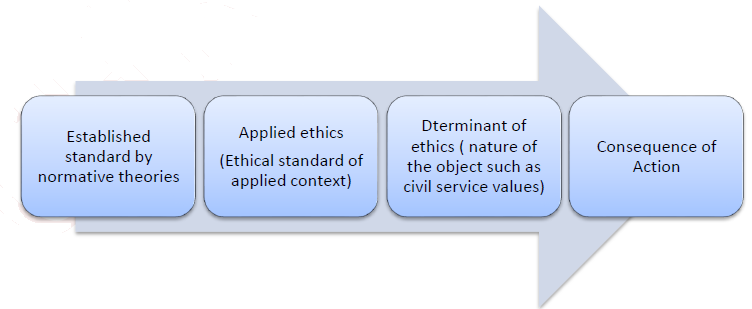
Example:
Demonetization is ethical or not?

Which human conduct is scrutinized by ethics?
Ethics scrutinizes broadly: A human conduct which is deliberate, it has three principles
1. Knowledge
2. Free will
3. Voluntariness

All three conditions should meet then the action will become deliberate and that action is subject to ethical scrutiny
Consistency and Flexibility
- Ethics are very consistent within a certain context, but can vary greatly between For example, the ethics of the medical profession in the 21st century are generally consistent and do not change from hospital to hospital, but they are different from the ethics of the 21st century legal profession.
- An individual’s moral code is usually unchanging and consistent across all contexts, but it is also possible for certain events to radically change an individual’s personal beliefs and
A Moral Person although perhaps bound by a higher covenant, may choose to follow a code of ethics as it would apply to a system. Ethics are governed by professional and legal guidelines within a particular time and place. Morality transcends cultural norms.
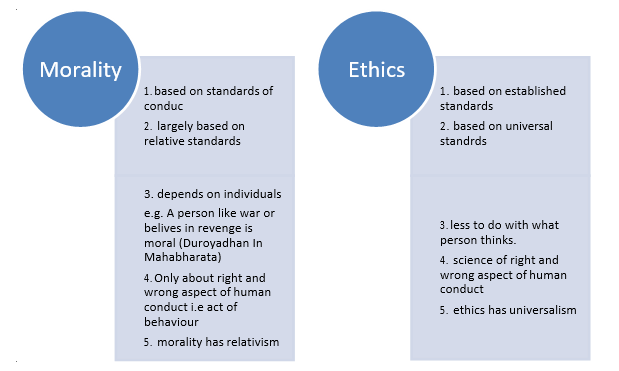
Aithidhi devo bhava is our moral standard but not universal standards
Examples (Case number one)

Case number two

Case number three
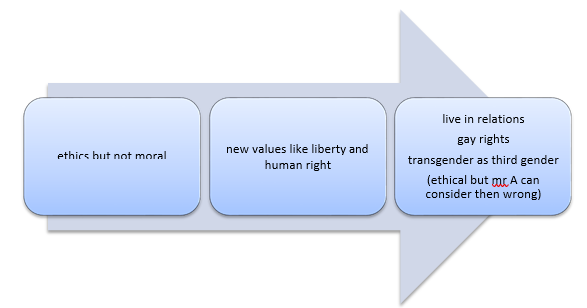
Values, morality and ethics:
- Values are standards of conduct. Morality and ethics are based on these standards of conduct.
- It means values are basis to both moral and ethical standards. But all values may not be moral and ethical because values can be postive and wrong

- Ethics, also described as moral philosophy, is a system of moral principles which is concerned with what is good for individuals and
- Law is a system of rules and guidelines which are enforced through social institutions to govern The law has moral basis as per Thomas Hobbes, it is for stability order, greatest good to greatest number of people as well as common good.
Generally it believed that laws are those made by legislature and implemented by state. There are other laws also such as
- Rule of law
- Natural law
- Law of nature
- Canon law by religion (theological law)
Contributions of Moral Thinkers and Philosophers from India and World
Aristotle
Introduction
The term used to define Aristotle’s ethics is known as Nichomachean Ethics which emphasis upon habits and talk about how habits are the foundation of a good life. There is a central focus on the concept of Happiness which is said to be the end goal of Aristotelian Ethics. Aristotle has paid a lot of attention to concepts of Wisdom and Virtue. Man has personal moral responsibility for his actions that is one of his founding beliefs. Ethics and politics are closely related, for politics is the science of creating a society in which men can live the good life and develop their full potential. Moral virtue is acquired by a combination of knowledge, habituation, and self-discipline. There are three central concepts of Virtue Ethics, namely: eudemonism, ethics of care and agent-based theories.
About Aristotle
ARISTOTLE was born at Stagira, a Macedonian city some two hundred miles to the north of Athens, in the year 384* b. c. His father was friend and physician to Amyntas, King of Macedon and grandfather of Alexander. Aristotle himself seems to have become a member of the great medical fraternity of Asclepiads. He was brought up in the odor of medicine as many later philosophers were brought up in the odor of sanctity; he had every opportunity and encouragement to develop a scientific bent of mind; he was prepared from the beginning to become the founder of science. Under Plato he studied eight—or twenty—years; Aristotle established his school, the Lyceum taking inspiration from Plato’s academy in the later years of his life. Aristotle’s writings ran into the hundreds. Some ancient authors credit him with four hundred volumes, others with a thousand. What remains is but a part, and yet it is a library in itself—conceive the scope and grandeur of the whole.
There are, first, the Logical works: “Categories,” “Topics,” “Prior” and “Posterior Analytics,” “Propositions,” and “Sophistical Refutation”; these works were collected and edited by the later Peripatetics under the general title of Aristotle’s “Organon,”—that is, the organ or instrument of correct thinking.
Basic Terms
- Doctrine of the Mean– virtue is a mean state between the vicious extremes of excess and deficiency. This doctrine is left necessarily vague, as Aristotle thinks that this mean varies from person to
- Eudemonia– Normally translated as “happiness,” eudemonia also carries connotations of success and
- Psyche– The root of our word psychology, psyche is generally translated as “soul,” though it carries none of the spiritual connotations of the Christian use of that word. Psyche is that unobservable property that distinguishes living things from nonliving
- Telos– end,” “goal,” or “purpose.” According to Aristotle, we have a telos as humans, which it is our goal to This telos is based on our uniquely human capacity for rational thought.
Primary Themes
- Virtue and Happiness
The word happiness in the Ethics is a translation of the Greek term eudaimonia, which carries connotations of success and fulfillment. For Aristotle, this happiness is our highest goal. Virtue, or rather excellence,1 will depend on clear judgment, self-control, symmetry of desire, artistry of means ; it is not the possession of the simple man, nor the gift of innocent intent, but the achievement of experience in the fully developed man.
2. Golden Mean
Loosely translated it means the middle path. The golden mean, however, is not, like the mathematical mean, an exact average of two precisely calculable extremes;it fluctuates with the collateral circumstances of each situation, and discovers itself only to mature and flexible reason. The golden mean represents a balance between extremes, i.e. vices. For example, courage is the middle between one extreme of deficiency (cowardness) and the other extreme of excess (recklessness).
Quotes by Aristotle
- The good for man is an activity of the soul in accordance with virtue, or if there are more kinds of virtue than one, in accordance with the best and most perfecd Kins
The point is that the good life is not an end state that we achieve but rather a way of life that we live. We might consider the cliché “life is a journey, not a destination” to convey
- So virtue is a purposive disposition, lying in a mean that is relative to us and determined by a rational principle, by that which a prudent man would use to determine
Virtue is a mean disposition between the vicious extremes of excess and deficiency. In we sit on and do nothing about, but is rather the impetus that leads us to virtuous activity.

